Unit 6 Do you like bananas?单元教案
文档属性
| 名称 | Unit 6 Do you like bananas?单元教案 | 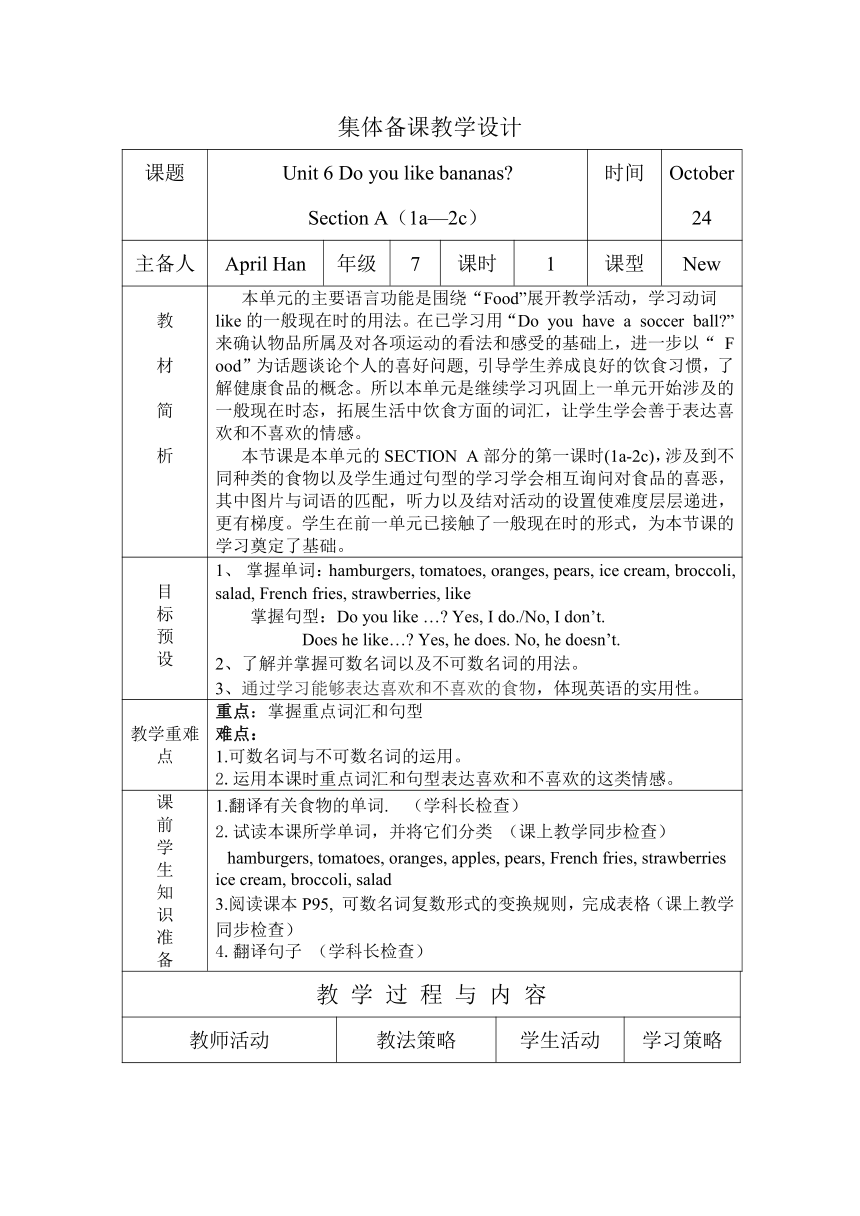 | |
| 格式 | zip | ||
| 文件大小 | 36.0KB | ||
| 资源类型 | 教案 | ||
| 版本资源 | 人教新目标(Go for it)版 | ||
| 科目 | 英语 | ||
| 更新时间 | 2011-11-29 08:32:12 | ||
图片预览

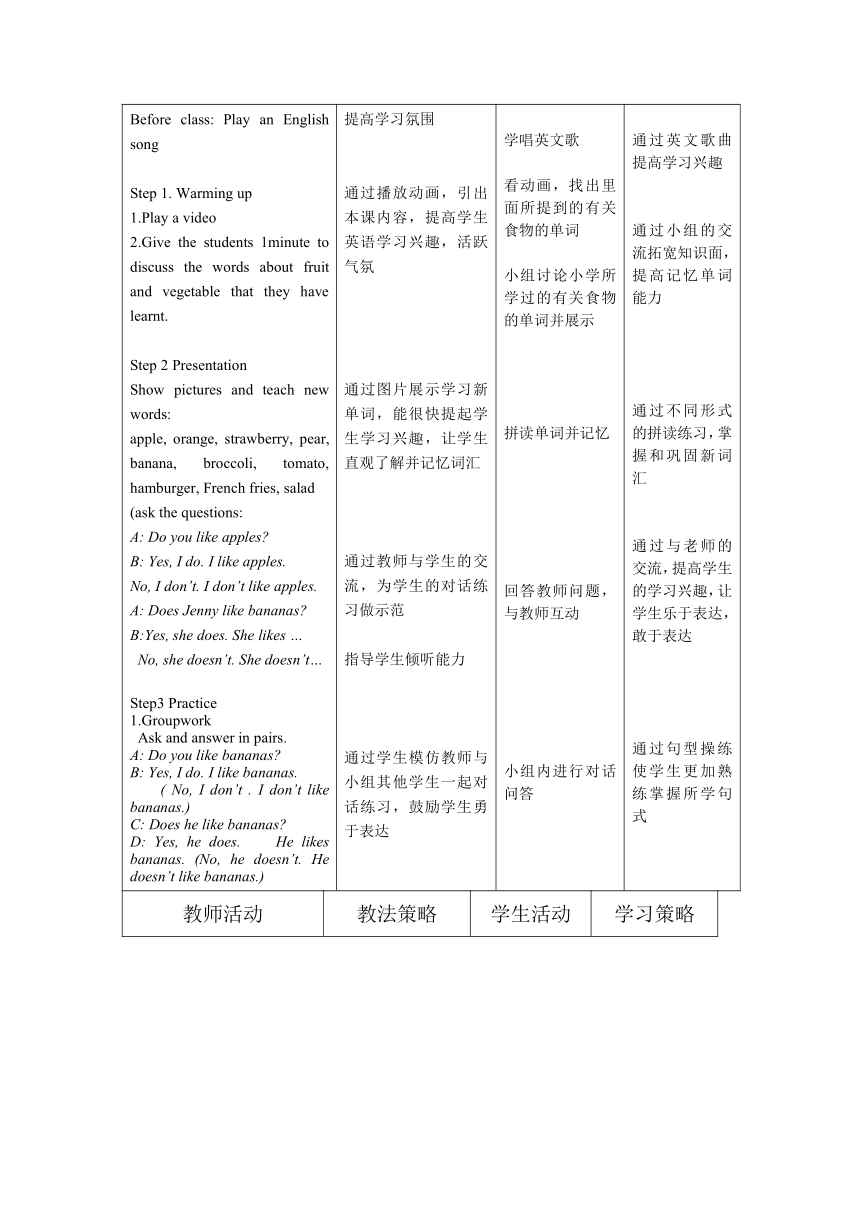
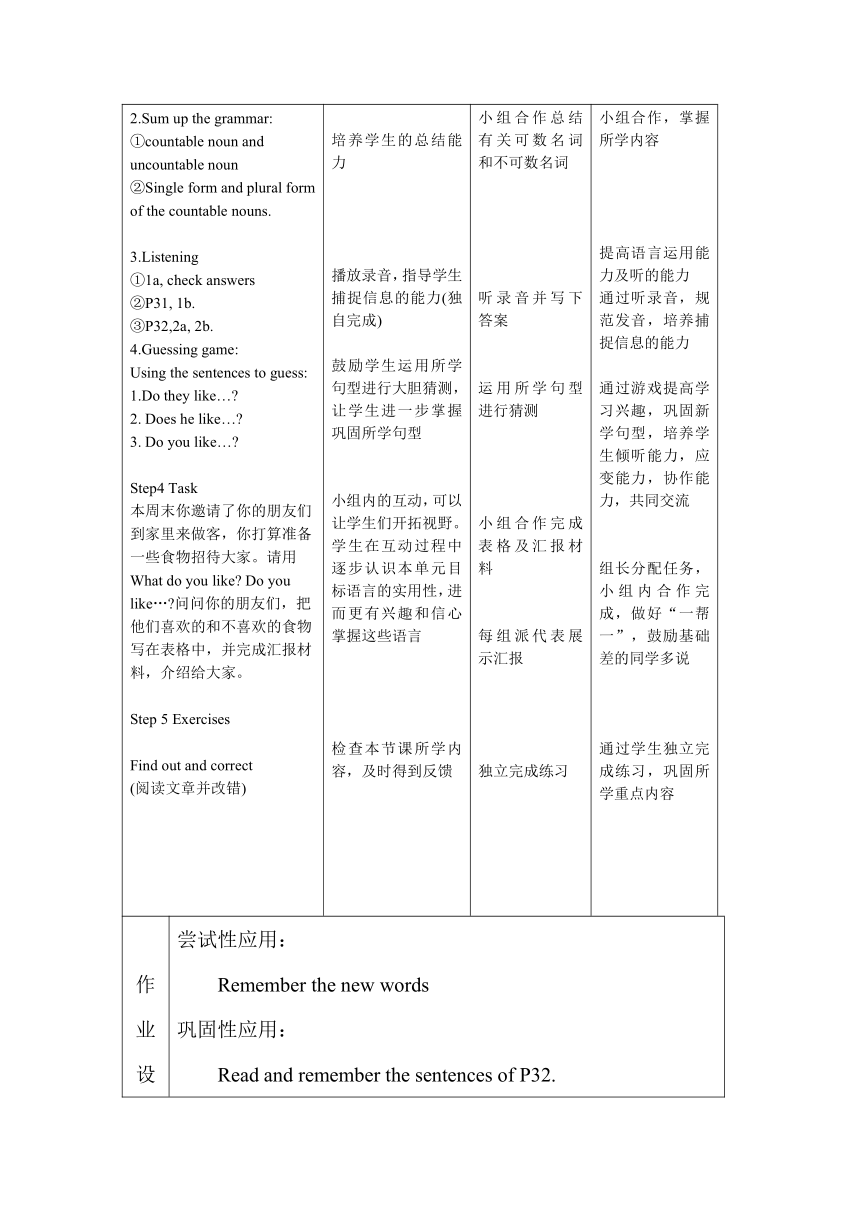
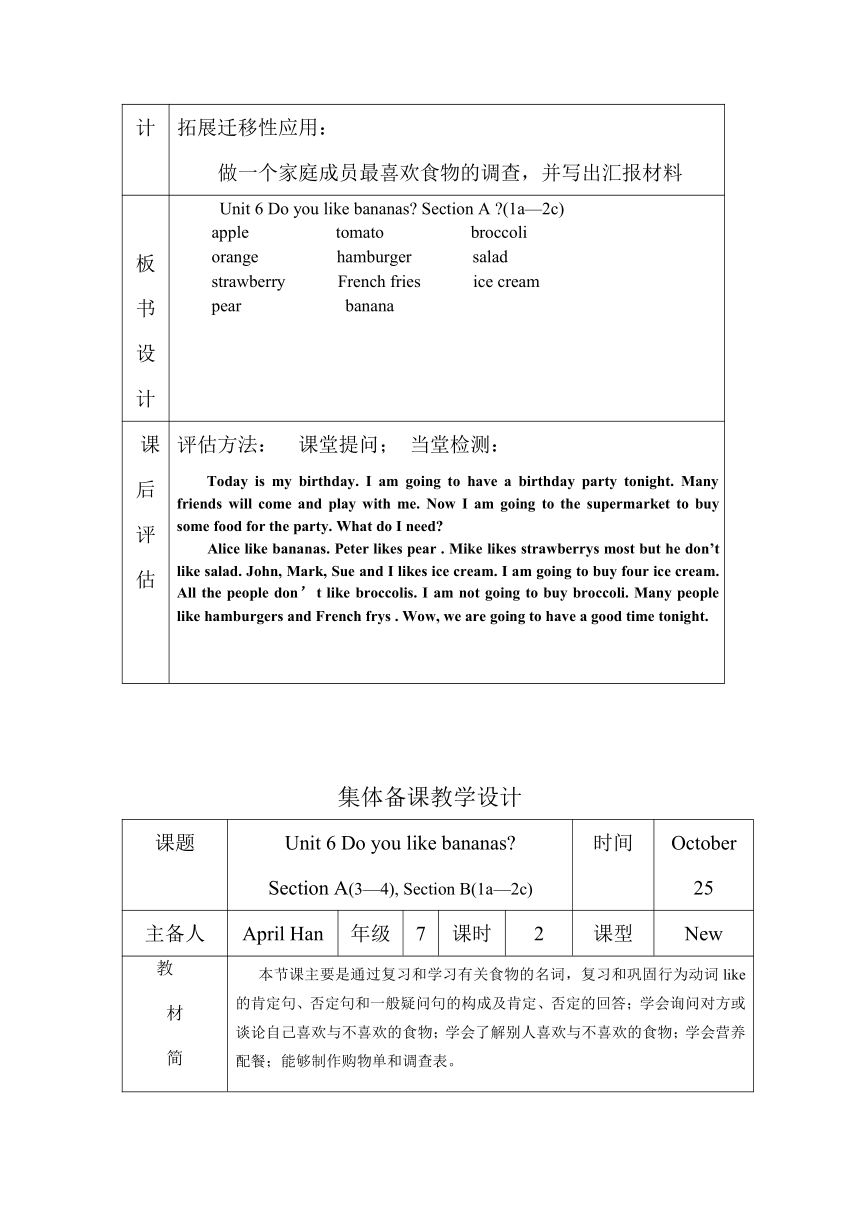
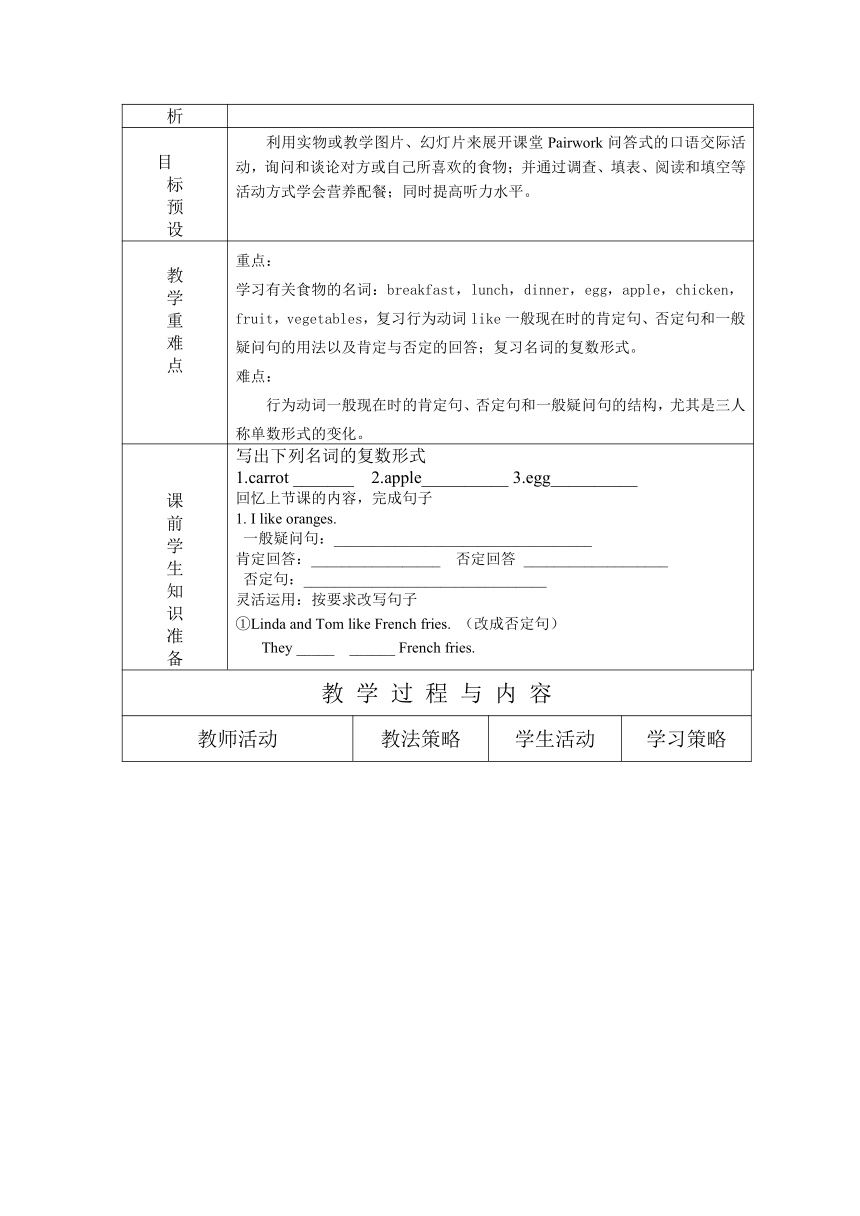
文档简介
集体备课教学设计
课题 Unit 6 Do you like bananas Section A(1a—2c) 时间 October 24
主备人 April Han 年级 7 课时 1 课型 New
教材简析 本单元的主要语言功能是围绕“Food”展开教学活动,学习动词 like的一般现在时的用法。在已学习用“Do you have a soccer ball ”来确认物品所属及对各项运动的看法和感受的基础上,进一步以“ Food”为话题谈论个人的喜好问题, 引导学生养成良好的饮食习惯,了解健康食品的概念。所以本单元是继续学习巩固上一单元开始涉及的一般现在时态,拓展生活中饮食方面的词汇,让学生学会善于表达喜欢和不喜欢的情感。本节课是本单元的SECTION A部分的第一课时(1a-2c),涉及到不同种类的食物以及学生通过句型的学习学会相互询问对食品的喜恶,其中图片与词语的匹配,听力以及结对活动的设置使难度层层递进,更有梯度。学生在前一单元已接触了一般现在时的形式,为本节课的学习奠定了基础。
目标预设 1、 掌握单词:hamburgers, tomatoes, oranges, pears, ice cream, broccoli, salad, French fries, strawberries, like掌握句型:Do you like … Yes, I do./No, I don’t. Does he like… Yes, he does. No, he doesn’t.2、了解并掌握可数名词以及不可数名词的用法。3、通过学习能够表达喜欢和不喜欢的食物,体现英语的实用性。
教学重难点 重点:掌握重点词汇和句型难点:1.可数名词与不可数名词的运用。2.运用本课时重点词汇和句型表达喜欢和不喜欢的这类情感。
课前学生知识准备 1.翻译有关食物的单词. (学科长检查)2.试读本课所学单词,并将它们分类 (课上教学同步检查)hamburgers, tomatoes, oranges, apples, pears, French fries, strawberries ice cream, broccoli, salad3.阅读课本P95, 可数名词复数形式的变换规则,完成表格(课上教学同步检查)4.翻译句子 (学科长检查)
教 学 过 程 与 内 容
教师活动 教法策略 学生活动 学习策略
Before class: Play an English songStep 1. Warming up1.Play a video2.Give the students 1minute to discuss the words about fruit and vegetable that they have learnt.Step 2 PresentationShow pictures and teach new words:apple, orange, strawberry, pear, banana, broccoli, tomato, hamburger, French fries, salad(ask the questions:A: Do you like apples B: Yes, I do. I like apples.No, I don’t. I don’t like apples.A: Does Jenny like bananas B:Yes, she does. She likes … No, she doesn’t. She doesn’t…Step3 Practice1.Groupwork Ask and answer in pairs.A: Do you like bananas B: Yes, I do. I like bananas. ( No, I don’t . I don’t like bananas.)C: Does he like bananas D: Yes, he does. He likes bananas. (No, he doesn’t. He doesn’t like bananas.) 提高学习氛围通过播放动画,引出本课内容,提高学生英语学习兴趣,活跃气氛通过图片展示学习新单词,能很快提起学生学习兴趣,让学生直观了解并记忆词汇通过教师与学生的交流,为学生的对话练习做示范指导学生倾听能力通过学生模仿教师与小组其他学生一起对话练习,鼓励学生勇于表达 学唱英文歌看动画,找出里面所提到的有关食物的单词小组讨论小学所学过的有关食物的单词并展示拼读单词并记忆回答教师问题,与教师互动小组内进行对话问答 通过英文歌曲提高学习兴趣通过小组的交流拓宽知识面,提高记忆单词能力通过不同形式的拼读练习,掌握和巩固新词汇通过与老师的交流,提高学生的学习兴趣,让学生乐于表达,敢于表达通过句型操练使学生更加熟练掌握所学句式
教师活动 教法策略 学生活动 学习策略
2.Sum up the grammar:①countable noun anduncountable noun②Single form and plural form of the countable nouns.3.Listening①1a, check answers②P31, 1b.③P32,2a, 2b.4.Guessing game:Using the sentences to guess:1.Do they like… 2. Does he like… 3. Do you like… Step4 Task本周末你邀请了你的朋友们到家里来做客,你打算准备一些食物招待大家。请用What do you like Do you like… 问问你的朋友们,把他们喜欢的和不喜欢的食物写在表格中,并完成汇报材料,介绍给大家。Step 5 ExercisesFind out and correct(阅读文章并改错) 培养学生的总结能力播放录音,指导学生捕捉信息的能力(独自完成)鼓励学生运用所学句型进行大胆猜测,让学生进一步掌握巩固所学句型小组内的互动,可以让学生们开拓视野。学生在互动过程中逐步认识本单元目标语言的实用性,进而更有兴趣和信心掌握这些语言检查本节课所学内容,及时得到反馈 小组合作总结有关可数名词和不可数名词听录音并写下答案运用所学句型进行猜测小组合作完成表格及汇报材料每组派代表展示汇报独立完成练习 小组合作,掌握所学内容提高语言运用能力及听的能力通过听录音,规范发音,培养捕捉信息的能力通过游戏提高学习兴趣,巩固新学句型,培养学生倾听能力,应变能力,协作能力,共同交流组长分配任务,小组内合作完成,做好“一帮一”,鼓励基础差的同学多说通过学生独立完成练习,巩固所学重点内容
作业设计 尝试性应用: Remember the new words 巩固性应用: Read and remember the sentences of P32.拓展迁移性应用: 做一个家庭成员最喜欢食物的调查,并写出汇报材料
板书设计 Unit 6 Do you like bananas Section A (1a—2c)apple tomato broccoliorange hamburger salad strawberry French fries ice creampear banana
课后评估 评估方法: 课堂提问; 当堂检测:Today is my birthday. I am going to have a birthday party tonight. Many friends will come and play with me. Now I am going to the supermarket to buy some food for the party. What do I need Alice like bananas. Peter likes pear . Mike likes strawberrys most but he don’t like salad. John, Mark, Sue and I likes ice cream. I am going to buy four ice cream. All the people don’t like broccolis. I am not going to buy broccoli. Many people like hamburgers and French frys . Wow, we are going to have a good time tonight.
集体备课教学设计
课题 Unit 6 Do you like bananas Section A(3—4), Section B(1a—2c) 时间 October 25
主备人 April Han 年级 7 课时 2 课型 New
教材简析 本节课主要是通过复习和学习有关食物的名词,复习和巩固行为动词like的肯定句、否定句和一般疑问句的构成及肯定、否定的回答;学会询问对方或谈论自己喜欢与不喜欢的食物;学会了解别人喜欢与不喜欢的食物;学会营养配餐;能够制作购物单和调查表。
目标预设 利用实物或教学图片、幻灯片来展开课堂Pairwork问答式的口语交际活动,询问和谈论对方或自己所喜欢的食物;并通过调查、填表、阅读和填空等活动方式学会营养配餐;同时提高听力水平。
教学重难点 重点:学习有关食物的名词:breakfast,lunch,dinner,egg,apple,chicken,fruit,vegetables,复习行为动词like一般现在时的肯定句、否定句和一般疑问句的用法以及肯定与否定的回答;复习名词的复数形式。难点: 行为动词一般现在时的肯定句、否定句和一般疑问句的结构,尤其是三人称单数形式的变化。
课前学生知识准备 写出下列名词的复数形式1.carrot _______ 2.apple__________ 3.egg__________回忆上节课的内容,完成句子1. I like oranges. 一般疑问句:__________________________________肯定回答:_________________ 否定回答 ___________________ 否定句:________________________________灵活运用:按要求改写句子 ①Linda and Tom like French fries. (改成否定句)They _____ ______ French fries.
教 学 过 程 与 内 容
教师活动 教法策略 学生活动 学习策略
Before class: Play an English videoStep 1. Warm-up1.Team PK 小组竞技教师出示竞技题目,学生抽签答题2.出示学习目标3. Chant: I like,you like,what do you like I like pears,you like oranges.She likes, he likes, what does he like He likes pears. She likes oranges.Step 2 Presentation1.Show picture and ask: What do your parents like Do your parents like… No, they don’t. They like tomatoes.2. Practice the dialogue:A: What do you like B: I like tomatoes.A: Does he like potatoes C: No, he doesn’t.A: What does he like D: He likes tomatoes.3. Guessing game What do they like 提高学习氛围通过竞赛形式调动学习积极性,了解学生对上节课内容的掌握情况调动学习氛围通过师生互动,拉近与学生的感情,复习上节课内容(教师指导学生小组对话,小组展示时教师注意指导学生如何倾听其它组发言)通过游戏提高学生英语学习兴趣,让学生能够轻松的掌握知识 看录像,并随内容一起活动学生抽签答题以小组为单位大声朗读对话小组活动,练习对话学生分组展示对话学生和老师一起游戏 用放video的方式既带动了课堂气氛,又复习了所学内容调动学习积极性,鼓励学生课下加强记忆训练增强团队意识,鼓励学生大声朗读学生与教师,同学和小组成员的对话交流,培养学生语言运用能力巩固所学内容让学生在游戏中掌握重点句型,巩固所学内容
教师活动 教法策略 学生活动 学习策略
Step 3 Practice1. Write the number in the box next to the correct food. (P34,1a)2.Listening practice P34,2a,2bStep 4 Summary总结一般现在时:一般现在时的结构:1.Be的一般现在时:在 上作变化2.V的一般现在时: 非第三人称单数:肯定句:主语+V(原) 否定句:主语+ +V(原) 一般疑问句: +主语+V(原) 第三人称单数:肯定句:V+ 动词三单数 否定句: +V(原) 一般疑问句: 提前 +V(原)3,特殊疑问句= +一般疑问句Exercises:1.His uncle (有)a computer.2. Dave _________(有)a red watch.3. Her sisters (喜欢)reading English books.4. Lin Hai (踢) football every day.5. Tom’s cousin (看)TV every night.6. They (有) a golf.7. My father and mother _____ (喜欢)broccoli.8.Jenny likes salad. ____ Jenny ___ salad Yes, she _____. 9. I like eggs. ____ you _____ eggs No, I _______. 10. Jim and Tom watch TV every day. ___ Jim and Tom _____ TV every day Yes, _____ ____. No, _____ ______.11. He has a strawberry. (用they改写) They _____ ____________. 12. We ______ have ice cream. (否定句)13. My father ______ play tennis.(同上)7. Let’s _____ cakes _____ breakfast. 及时反馈所学内容播放录音,指导学生捕捉信息的能力(独自完成)提高学生语法总结能力,帮助学生知识系统化检查本节课所学内容,及时得到反馈检查一般现在时内容,及时得到反馈 独立完成单词匹配练习听录音并写下答案小组活动完成总结内容组长组织组内成员做游戏独立写出答案 巩固新单词提高语言运用能力及听的能力通过听录音,规范发音,培养捕捉信息的能力系统掌握一般现在时语法让学生总结名字的不同,有助于加深印象通过学生独立完成练习,巩固一般现在时态
作业设计 尝试性应用: Remember the new words 巩固性应用: Read and remember the dialogue of P86, Section B,2a,2b.拓展迁移性应用: Write down a passage about what they like and don’t like
板书设计 Unit 6 Do you like bananas food fruit vegetableegg apple carrotchickenbreakfast lunch dinner
课后评估 评估方法:课堂提问,当堂检测用括号中所给词的正确形式填空1.There are some ________(tomato)in the basket. 2.Do you like French ________(fry) 3.She ________(have)ice cream for dessert. 4.The little girl likes ________(strawberry)a lot.5.She ________(do not)play sports. 6.________ your mother ________(watch)TV every day 7. Lots of children like ________(play)football.8. Chicken ________(be)very delicious. 9. My daughter ________(go)to school from Monday to Friday.
集体备课教学设计
课题 Unit 6 Do you like bananas Section B(3a—3c) 时间 October 26
主备人 April Han 年级 7 课时 3 课型 New
教材简析 本节课通过对短文的Runner eats well的学习,来谈论运动员一日三餐吃什么东西,并要求学生在阅读完之后结合自己的情况学出自己一日三餐吃什么事物,达到写作训练的目的。在小组活动中,讨论野餐中需要购买的食物,调动了学生的积极性,本课内容与学生生活紧密联系,注重学生阅读与写作训练。
目标预设 1、学会谈论自己与他人早、中、晚餐喜欢吃的食物。2、通过教学达到读和写的训练,培养学生自主学习和合作学习的精神。3、通过本课学习,使学生了解中西方饮食上的差异,增强师生间的相互了解。
教学重难点 重点:like的肯定句,及主语是第三人称单数时,动词likes的句型。难点:用like 进行写作训练
课前学生知识准备 1.试读P35 单词,并完成下列内容① 奔跑者________ (复数 ________ ) 跑(动词)_______② 吃______(加上一个字母变成_____)③ well_______(音标)(形容词_______)2.回忆上节课内容,完成句子二、阅读P35,3a 课文,完成下面内容1.找出表示水果和蔬菜的单词 Fruit: __________________________________Vegetables :_____________________________________2.阅读课文,了解Sandra Clark的饮食,完成表格:
教 学 过 程 与 内 容
教师活动 教法策略 学生活动 学习策略
Before class: Play an English videoStep 1. Warm-up1.Guessing game:What do I like for breakfast What does he like for lunch What does she like for dinner 2. Ask and answer in pairs:A: What do you like for breakfast/lunch/dinner B: I like …and…for…C: I like …and…for…D: I like …and…for…Step 2 Presentation1.Teach new words: healthy, run, runner, running, star, lots of.2. Play the tape and show the questions3.Give Ss two minute to read the article. Underline the fruits and circle the vegetables.4.Read the article and answer questions1.What does Sandra like for breakfast 2.What does Sandra like for lunch 3.What does Sandra like for dinner 4.What about her dessert 提高学习氛围通过游戏形式调动学习积极性,了解学生对上节课内容的掌握情况通过学生模仿教师与小组其他学生一起对话练习,鼓励学生勇于表达通过师生互动,拉近与学生的感情,以不同形式教授新单词教师指导学生独立阅读,小组展示时教师注意指导学生如何倾听其它组发言 看录像,并随内容一起活动学生活动,用上节课所学内容进行问答以小组为单位大声朗读对话大声朗读,学习新单词学生独自阅读课文,完成任务再读课文,回答问题 用放video的方式既带动了课堂气氛,又复习了所学内容调动学习积极性,鼓励学生灵活运用所学语言通过句型操练使学生更加熟练掌握所学句式学生与教师,同学和小组成员的对话交流,培养学生语言运用能力了解课文内容,提高自读能力培养学生捕捉信息的能力
教师活动 教法策略 学生活动 学习策略
Step 3 Practice1.3b. Write about what Tom likes to eat for breakfast, lunch, and dinner. (After 3 minutes to call students to show)2.你们小组成员一日三餐喜欢吃什么食物?讨论一下,并把他记录下来。namebreakfastlunchdinner Report: Mary likes…for breakfast. She likes..for lunch and …for dinner…Step 4 Exercises任务型阅读 根据材料,请找出Jim Green为家人准备的晚餐,并填写表格 Today is my birthday. I want to thank my family for their love. So I cook the dinner for them. I know my mother likes hamburgers and broccoli. But my father likes chicken and tomato soup. I have a brother. He likes hamburgers, too. But he doesn’t like broccoli. He likes carrots. I have a sister, too. She likes fish and French fries. I like chicken and strawberries. I will buy these things for the birthday party. 及时反馈学生对所学内容的掌握情况小组内的互动,可以让学生们开拓视野。学生在互动过程中逐步认识本单元目标语言的实用性,进而更有兴趣和信心掌握这些语言直到阅读方法,提高阅读能力 独立完成单词填写练习小组合作完成表格及汇报材料每组派代表展示汇报独立阅读,写出答案 灵活运用所学内容提高语言运用能力及听的能力组长分配任务,小组内合作完成,做好“一帮一”培养学生捕捉信息的能力
作业设计 尝试性应用: Read 3a by themslves 巩固性应用: Remember the passage.拓展迁移性应用: Write down a passage about what they eat for breakfast,lunch and dinner.
板书设计 Unit 6 Do you like bananas run What do you like for breakfast runner I like … for … running lots of healthy
课后评估 评估方法:课堂提问,当堂检测根据材料,请找出Jim Green为家人准备的晚餐,并填写表格 Today is my birthday. I want to thank my family for their love. So I cook the dinner for them. I know my mother likes hamburgers and broccoli. But my father likes chicken and tomato soup. I have a brother. He likes hamburgers, too. But he doesn’t like broccoli. He likes carrots. I have a sister, too. She likes fish and French fries. I like chicken and strawberries. I will buy these things for the birthday party.
集体备课教学设计
课题 Unit 6 Do you like bananas Self Check 时间 October 27
主备人 April Han 年级 7 课时 4 课型 New
教材简析 本节课是第四课时,对本单元学过的重点单词和句型进行复习。在课上,要为学生营造良好的学习英语的氛围,鼓励学生在新的环境下运用体验、实践、讨论、合作、探究等方式,发展听、说、读、写等综合语言技能。
目标预设 1.掌握单词和重点句型2.掌握可数名词和不可数名词的用法3. 能够表达喜欢和不喜欢的食物,体现英语的实用性4. 并通过调查、填表、阅读和填空等活动方式学会营养配餐;同时提高听力水平。
教学重难点 1)词汇和句型 2)可数名词与不可数名词的用法
课前学生知识准备 1.词语积累:Do you like food What kind of food you know 2.找出本单元的词组3.列出本单元的主要句型4、翻译句子:1)克拉克常吃很多的健康食品:2)早餐他喜欢吃鸡蛋、香蕉和苹果。3)你喜欢吃西红柿吗?(小组学科长课前检查)
教 学 过 程 与 内 容
教师活动 教法策略 学生活动 学习策略
Step 1. Warming up1.Play an English song.2. Play a game: What do you like I like apples.I like apples and bananas.I like apples, bananas and pears.I like apples, bananas, pears and strawberries.……Step2. Practice1. show some words and write Plural Form.Carrot apple egg class family strawberry bananaorange tomato hamburger watch photo2. Call students to sum the grammar3.Show sentences and revise the Present Simple Tense.4. Group work:A: Do you like bananas B: Yes, I do. I like bananas. ( No, I don’t . I don’t like bananas.)C: Does he like bananas D: Yes, he does. He likes bananas. (No, he doesn’t. He doesn’t like bananas.)Step 3 ExericsesWrite down the answers (后附练习材料) 活跃气氛,放松心情通过游戏复习本单元的有关食物的单词,培养学习兴趣指导发音复习可数名词单数变复数教师指导总结方法帮助他们掌握规律,体验成功通过小组之间的对话练习,鼓励学生勇于表达(教师巡视,鼓励学生大声对话)指导答题方法,及时了解学生课上掌握情况 齐唱英文歌曲以排为单位进行游戏,说错的罚唱歌独立写出可数名词复数形式小组活动,总结变换方式小组活动,完成对话组长分配角色,并及时交换角色独立完成练习 放松心情,复习所学内容放松心情,复习单词,纠正发音通过练习巩固知识,查找自身不足通过小组互助,掌握方法通过句型操练更加熟练掌握所学句式通过答题,巩固本节课所学单词和句型
作业设计 尝试性应用: Remember the words of this unit巩固性应用: Sum up the important grammar拓展迁移性应用: Make a survey and talk about their friends’ favorite food
板书设计 Unit 6 Do you like bananas 一般现在时的结构:1.Be的一般现在时:在 上作变化2.V的一般现在时: 非第三人称单数:肯定句:主语+V(原) 否定句:主语+ +V(原) 一般疑问句: +主语+V(原) 第三人称单数:肯定句:V+ 动词三单数 否定句: +V(原) 一般疑问句: 提前 +V(原)3,特殊疑问句= +一般疑问句
课后评估 评估方法:课堂提问,当堂检测补全对话。每空填入一词,使对话完整、达意。 A:Hi,Tom!(1)____________ you like apples? B:Yes,(2)____________ do.How about you? A:I like apples.And my father(3)____________ apples,too.Does your father(4)____________ apples? B:No,he(5)____________ .He likes oranges and bread (6)________ breakfast.What about(7)____________ father? A:He likes chicken(8)____________milk. B:(9)____________does your mother like? A:Oh!She likes ice cream and hamburgers. B:Does she like carrots? A:No,she doesn't.(10)__________ she likes broccoli.Do you like broccoli? B:No,I don't.
课题 Unit 6 Do you like bananas Section A(1a—2c) 时间 October 24
主备人 April Han 年级 7 课时 1 课型 New
教材简析 本单元的主要语言功能是围绕“Food”展开教学活动,学习动词 like的一般现在时的用法。在已学习用“Do you have a soccer ball ”来确认物品所属及对各项运动的看法和感受的基础上,进一步以“ Food”为话题谈论个人的喜好问题, 引导学生养成良好的饮食习惯,了解健康食品的概念。所以本单元是继续学习巩固上一单元开始涉及的一般现在时态,拓展生活中饮食方面的词汇,让学生学会善于表达喜欢和不喜欢的情感。本节课是本单元的SECTION A部分的第一课时(1a-2c),涉及到不同种类的食物以及学生通过句型的学习学会相互询问对食品的喜恶,其中图片与词语的匹配,听力以及结对活动的设置使难度层层递进,更有梯度。学生在前一单元已接触了一般现在时的形式,为本节课的学习奠定了基础。
目标预设 1、 掌握单词:hamburgers, tomatoes, oranges, pears, ice cream, broccoli, salad, French fries, strawberries, like掌握句型:Do you like … Yes, I do./No, I don’t. Does he like… Yes, he does. No, he doesn’t.2、了解并掌握可数名词以及不可数名词的用法。3、通过学习能够表达喜欢和不喜欢的食物,体现英语的实用性。
教学重难点 重点:掌握重点词汇和句型难点:1.可数名词与不可数名词的运用。2.运用本课时重点词汇和句型表达喜欢和不喜欢的这类情感。
课前学生知识准备 1.翻译有关食物的单词. (学科长检查)2.试读本课所学单词,并将它们分类 (课上教学同步检查)hamburgers, tomatoes, oranges, apples, pears, French fries, strawberries ice cream, broccoli, salad3.阅读课本P95, 可数名词复数形式的变换规则,完成表格(课上教学同步检查)4.翻译句子 (学科长检查)
教 学 过 程 与 内 容
教师活动 教法策略 学生活动 学习策略
Before class: Play an English songStep 1. Warming up1.Play a video2.Give the students 1minute to discuss the words about fruit and vegetable that they have learnt.Step 2 PresentationShow pictures and teach new words:apple, orange, strawberry, pear, banana, broccoli, tomato, hamburger, French fries, salad(ask the questions:A: Do you like apples B: Yes, I do. I like apples.No, I don’t. I don’t like apples.A: Does Jenny like bananas B:Yes, she does. She likes … No, she doesn’t. She doesn’t…Step3 Practice1.Groupwork Ask and answer in pairs.A: Do you like bananas B: Yes, I do. I like bananas. ( No, I don’t . I don’t like bananas.)C: Does he like bananas D: Yes, he does. He likes bananas. (No, he doesn’t. He doesn’t like bananas.) 提高学习氛围通过播放动画,引出本课内容,提高学生英语学习兴趣,活跃气氛通过图片展示学习新单词,能很快提起学生学习兴趣,让学生直观了解并记忆词汇通过教师与学生的交流,为学生的对话练习做示范指导学生倾听能力通过学生模仿教师与小组其他学生一起对话练习,鼓励学生勇于表达 学唱英文歌看动画,找出里面所提到的有关食物的单词小组讨论小学所学过的有关食物的单词并展示拼读单词并记忆回答教师问题,与教师互动小组内进行对话问答 通过英文歌曲提高学习兴趣通过小组的交流拓宽知识面,提高记忆单词能力通过不同形式的拼读练习,掌握和巩固新词汇通过与老师的交流,提高学生的学习兴趣,让学生乐于表达,敢于表达通过句型操练使学生更加熟练掌握所学句式
教师活动 教法策略 学生活动 学习策略
2.Sum up the grammar:①countable noun anduncountable noun②Single form and plural form of the countable nouns.3.Listening①1a, check answers②P31, 1b.③P32,2a, 2b.4.Guessing game:Using the sentences to guess:1.Do they like… 2. Does he like… 3. Do you like… Step4 Task本周末你邀请了你的朋友们到家里来做客,你打算准备一些食物招待大家。请用What do you like Do you like… 问问你的朋友们,把他们喜欢的和不喜欢的食物写在表格中,并完成汇报材料,介绍给大家。Step 5 ExercisesFind out and correct(阅读文章并改错) 培养学生的总结能力播放录音,指导学生捕捉信息的能力(独自完成)鼓励学生运用所学句型进行大胆猜测,让学生进一步掌握巩固所学句型小组内的互动,可以让学生们开拓视野。学生在互动过程中逐步认识本单元目标语言的实用性,进而更有兴趣和信心掌握这些语言检查本节课所学内容,及时得到反馈 小组合作总结有关可数名词和不可数名词听录音并写下答案运用所学句型进行猜测小组合作完成表格及汇报材料每组派代表展示汇报独立完成练习 小组合作,掌握所学内容提高语言运用能力及听的能力通过听录音,规范发音,培养捕捉信息的能力通过游戏提高学习兴趣,巩固新学句型,培养学生倾听能力,应变能力,协作能力,共同交流组长分配任务,小组内合作完成,做好“一帮一”,鼓励基础差的同学多说通过学生独立完成练习,巩固所学重点内容
作业设计 尝试性应用: Remember the new words 巩固性应用: Read and remember the sentences of P32.拓展迁移性应用: 做一个家庭成员最喜欢食物的调查,并写出汇报材料
板书设计 Unit 6 Do you like bananas Section A (1a—2c)apple tomato broccoliorange hamburger salad strawberry French fries ice creampear banana
课后评估 评估方法: 课堂提问; 当堂检测:Today is my birthday. I am going to have a birthday party tonight. Many friends will come and play with me. Now I am going to the supermarket to buy some food for the party. What do I need Alice like bananas. Peter likes pear . Mike likes strawberrys most but he don’t like salad. John, Mark, Sue and I likes ice cream. I am going to buy four ice cream. All the people don’t like broccolis. I am not going to buy broccoli. Many people like hamburgers and French frys . Wow, we are going to have a good time tonight.
集体备课教学设计
课题 Unit 6 Do you like bananas Section A(3—4), Section B(1a—2c) 时间 October 25
主备人 April Han 年级 7 课时 2 课型 New
教材简析 本节课主要是通过复习和学习有关食物的名词,复习和巩固行为动词like的肯定句、否定句和一般疑问句的构成及肯定、否定的回答;学会询问对方或谈论自己喜欢与不喜欢的食物;学会了解别人喜欢与不喜欢的食物;学会营养配餐;能够制作购物单和调查表。
目标预设 利用实物或教学图片、幻灯片来展开课堂Pairwork问答式的口语交际活动,询问和谈论对方或自己所喜欢的食物;并通过调查、填表、阅读和填空等活动方式学会营养配餐;同时提高听力水平。
教学重难点 重点:学习有关食物的名词:breakfast,lunch,dinner,egg,apple,chicken,fruit,vegetables,复习行为动词like一般现在时的肯定句、否定句和一般疑问句的用法以及肯定与否定的回答;复习名词的复数形式。难点: 行为动词一般现在时的肯定句、否定句和一般疑问句的结构,尤其是三人称单数形式的变化。
课前学生知识准备 写出下列名词的复数形式1.carrot _______ 2.apple__________ 3.egg__________回忆上节课的内容,完成句子1. I like oranges. 一般疑问句:__________________________________肯定回答:_________________ 否定回答 ___________________ 否定句:________________________________灵活运用:按要求改写句子 ①Linda and Tom like French fries. (改成否定句)They _____ ______ French fries.
教 学 过 程 与 内 容
教师活动 教法策略 学生活动 学习策略
Before class: Play an English videoStep 1. Warm-up1.Team PK 小组竞技教师出示竞技题目,学生抽签答题2.出示学习目标3. Chant: I like,you like,what do you like I like pears,you like oranges.She likes, he likes, what does he like He likes pears. She likes oranges.Step 2 Presentation1.Show picture and ask: What do your parents like Do your parents like… No, they don’t. They like tomatoes.2. Practice the dialogue:A: What do you like B: I like tomatoes.A: Does he like potatoes C: No, he doesn’t.A: What does he like D: He likes tomatoes.3. Guessing game What do they like 提高学习氛围通过竞赛形式调动学习积极性,了解学生对上节课内容的掌握情况调动学习氛围通过师生互动,拉近与学生的感情,复习上节课内容(教师指导学生小组对话,小组展示时教师注意指导学生如何倾听其它组发言)通过游戏提高学生英语学习兴趣,让学生能够轻松的掌握知识 看录像,并随内容一起活动学生抽签答题以小组为单位大声朗读对话小组活动,练习对话学生分组展示对话学生和老师一起游戏 用放video的方式既带动了课堂气氛,又复习了所学内容调动学习积极性,鼓励学生课下加强记忆训练增强团队意识,鼓励学生大声朗读学生与教师,同学和小组成员的对话交流,培养学生语言运用能力巩固所学内容让学生在游戏中掌握重点句型,巩固所学内容
教师活动 教法策略 学生活动 学习策略
Step 3 Practice1. Write the number in the box next to the correct food. (P34,1a)2.Listening practice P34,2a,2bStep 4 Summary总结一般现在时:一般现在时的结构:1.Be的一般现在时:在 上作变化2.V的一般现在时: 非第三人称单数:肯定句:主语+V(原) 否定句:主语+ +V(原) 一般疑问句: +主语+V(原) 第三人称单数:肯定句:V+ 动词三单数 否定句: +V(原) 一般疑问句: 提前 +V(原)3,特殊疑问句= +一般疑问句Exercises:1.His uncle (有)a computer.2. Dave _________(有)a red watch.3. Her sisters (喜欢)reading English books.4. Lin Hai (踢) football every day.5. Tom’s cousin (看)TV every night.6. They (有) a golf.7. My father and mother _____ (喜欢)broccoli.8.Jenny likes salad. ____ Jenny ___ salad Yes, she _____. 9. I like eggs. ____ you _____ eggs No, I _______. 10. Jim and Tom watch TV every day. ___ Jim and Tom _____ TV every day Yes, _____ ____. No, _____ ______.11. He has a strawberry. (用they改写) They _____ ____________. 12. We ______ have ice cream. (否定句)13. My father ______ play tennis.(同上)7. Let’s _____ cakes _____ breakfast. 及时反馈所学内容播放录音,指导学生捕捉信息的能力(独自完成)提高学生语法总结能力,帮助学生知识系统化检查本节课所学内容,及时得到反馈检查一般现在时内容,及时得到反馈 独立完成单词匹配练习听录音并写下答案小组活动完成总结内容组长组织组内成员做游戏独立写出答案 巩固新单词提高语言运用能力及听的能力通过听录音,规范发音,培养捕捉信息的能力系统掌握一般现在时语法让学生总结名字的不同,有助于加深印象通过学生独立完成练习,巩固一般现在时态
作业设计 尝试性应用: Remember the new words 巩固性应用: Read and remember the dialogue of P86, Section B,2a,2b.拓展迁移性应用: Write down a passage about what they like and don’t like
板书设计 Unit 6 Do you like bananas food fruit vegetableegg apple carrotchickenbreakfast lunch dinner
课后评估 评估方法:课堂提问,当堂检测用括号中所给词的正确形式填空1.There are some ________(tomato)in the basket. 2.Do you like French ________(fry) 3.She ________(have)ice cream for dessert. 4.The little girl likes ________(strawberry)a lot.5.She ________(do not)play sports. 6.________ your mother ________(watch)TV every day 7. Lots of children like ________(play)football.8. Chicken ________(be)very delicious. 9. My daughter ________(go)to school from Monday to Friday.
集体备课教学设计
课题 Unit 6 Do you like bananas Section B(3a—3c) 时间 October 26
主备人 April Han 年级 7 课时 3 课型 New
教材简析 本节课通过对短文的Runner eats well的学习,来谈论运动员一日三餐吃什么东西,并要求学生在阅读完之后结合自己的情况学出自己一日三餐吃什么事物,达到写作训练的目的。在小组活动中,讨论野餐中需要购买的食物,调动了学生的积极性,本课内容与学生生活紧密联系,注重学生阅读与写作训练。
目标预设 1、学会谈论自己与他人早、中、晚餐喜欢吃的食物。2、通过教学达到读和写的训练,培养学生自主学习和合作学习的精神。3、通过本课学习,使学生了解中西方饮食上的差异,增强师生间的相互了解。
教学重难点 重点:like的肯定句,及主语是第三人称单数时,动词likes的句型。难点:用like 进行写作训练
课前学生知识准备 1.试读P35 单词,并完成下列内容① 奔跑者________ (复数 ________ ) 跑(动词)_______② 吃______(加上一个字母变成_____)③ well_______(音标)(形容词_______)2.回忆上节课内容,完成句子二、阅读P35,3a 课文,完成下面内容1.找出表示水果和蔬菜的单词 Fruit: __________________________________Vegetables :_____________________________________2.阅读课文,了解Sandra Clark的饮食,完成表格:
教 学 过 程 与 内 容
教师活动 教法策略 学生活动 学习策略
Before class: Play an English videoStep 1. Warm-up1.Guessing game:What do I like for breakfast What does he like for lunch What does she like for dinner 2. Ask and answer in pairs:A: What do you like for breakfast/lunch/dinner B: I like …and…for…C: I like …and…for…D: I like …and…for…Step 2 Presentation1.Teach new words: healthy, run, runner, running, star, lots of.2. Play the tape and show the questions3.Give Ss two minute to read the article. Underline the fruits and circle the vegetables.4.Read the article and answer questions1.What does Sandra like for breakfast 2.What does Sandra like for lunch 3.What does Sandra like for dinner 4.What about her dessert 提高学习氛围通过游戏形式调动学习积极性,了解学生对上节课内容的掌握情况通过学生模仿教师与小组其他学生一起对话练习,鼓励学生勇于表达通过师生互动,拉近与学生的感情,以不同形式教授新单词教师指导学生独立阅读,小组展示时教师注意指导学生如何倾听其它组发言 看录像,并随内容一起活动学生活动,用上节课所学内容进行问答以小组为单位大声朗读对话大声朗读,学习新单词学生独自阅读课文,完成任务再读课文,回答问题 用放video的方式既带动了课堂气氛,又复习了所学内容调动学习积极性,鼓励学生灵活运用所学语言通过句型操练使学生更加熟练掌握所学句式学生与教师,同学和小组成员的对话交流,培养学生语言运用能力了解课文内容,提高自读能力培养学生捕捉信息的能力
教师活动 教法策略 学生活动 学习策略
Step 3 Practice1.3b. Write about what Tom likes to eat for breakfast, lunch, and dinner. (After 3 minutes to call students to show)2.你们小组成员一日三餐喜欢吃什么食物?讨论一下,并把他记录下来。namebreakfastlunchdinner Report: Mary likes…for breakfast. She likes..for lunch and …for dinner…Step 4 Exercises任务型阅读 根据材料,请找出Jim Green为家人准备的晚餐,并填写表格 Today is my birthday. I want to thank my family for their love. So I cook the dinner for them. I know my mother likes hamburgers and broccoli. But my father likes chicken and tomato soup. I have a brother. He likes hamburgers, too. But he doesn’t like broccoli. He likes carrots. I have a sister, too. She likes fish and French fries. I like chicken and strawberries. I will buy these things for the birthday party. 及时反馈学生对所学内容的掌握情况小组内的互动,可以让学生们开拓视野。学生在互动过程中逐步认识本单元目标语言的实用性,进而更有兴趣和信心掌握这些语言直到阅读方法,提高阅读能力 独立完成单词填写练习小组合作完成表格及汇报材料每组派代表展示汇报独立阅读,写出答案 灵活运用所学内容提高语言运用能力及听的能力组长分配任务,小组内合作完成,做好“一帮一”培养学生捕捉信息的能力
作业设计 尝试性应用: Read 3a by themslves 巩固性应用: Remember the passage.拓展迁移性应用: Write down a passage about what they eat for breakfast,lunch and dinner.
板书设计 Unit 6 Do you like bananas run What do you like for breakfast runner I like … for … running lots of healthy
课后评估 评估方法:课堂提问,当堂检测根据材料,请找出Jim Green为家人准备的晚餐,并填写表格 Today is my birthday. I want to thank my family for their love. So I cook the dinner for them. I know my mother likes hamburgers and broccoli. But my father likes chicken and tomato soup. I have a brother. He likes hamburgers, too. But he doesn’t like broccoli. He likes carrots. I have a sister, too. She likes fish and French fries. I like chicken and strawberries. I will buy these things for the birthday party.
集体备课教学设计
课题 Unit 6 Do you like bananas Self Check 时间 October 27
主备人 April Han 年级 7 课时 4 课型 New
教材简析 本节课是第四课时,对本单元学过的重点单词和句型进行复习。在课上,要为学生营造良好的学习英语的氛围,鼓励学生在新的环境下运用体验、实践、讨论、合作、探究等方式,发展听、说、读、写等综合语言技能。
目标预设 1.掌握单词和重点句型2.掌握可数名词和不可数名词的用法3. 能够表达喜欢和不喜欢的食物,体现英语的实用性4. 并通过调查、填表、阅读和填空等活动方式学会营养配餐;同时提高听力水平。
教学重难点 1)词汇和句型 2)可数名词与不可数名词的用法
课前学生知识准备 1.词语积累:Do you like food What kind of food you know 2.找出本单元的词组3.列出本单元的主要句型4、翻译句子:1)克拉克常吃很多的健康食品:2)早餐他喜欢吃鸡蛋、香蕉和苹果。3)你喜欢吃西红柿吗?(小组学科长课前检查)
教 学 过 程 与 内 容
教师活动 教法策略 学生活动 学习策略
Step 1. Warming up1.Play an English song.2. Play a game: What do you like I like apples.I like apples and bananas.I like apples, bananas and pears.I like apples, bananas, pears and strawberries.……Step2. Practice1. show some words and write Plural Form.Carrot apple egg class family strawberry bananaorange tomato hamburger watch photo2. Call students to sum the grammar3.Show sentences and revise the Present Simple Tense.4. Group work:A: Do you like bananas B: Yes, I do. I like bananas. ( No, I don’t . I don’t like bananas.)C: Does he like bananas D: Yes, he does. He likes bananas. (No, he doesn’t. He doesn’t like bananas.)Step 3 ExericsesWrite down the answers (后附练习材料) 活跃气氛,放松心情通过游戏复习本单元的有关食物的单词,培养学习兴趣指导发音复习可数名词单数变复数教师指导总结方法帮助他们掌握规律,体验成功通过小组之间的对话练习,鼓励学生勇于表达(教师巡视,鼓励学生大声对话)指导答题方法,及时了解学生课上掌握情况 齐唱英文歌曲以排为单位进行游戏,说错的罚唱歌独立写出可数名词复数形式小组活动,总结变换方式小组活动,完成对话组长分配角色,并及时交换角色独立完成练习 放松心情,复习所学内容放松心情,复习单词,纠正发音通过练习巩固知识,查找自身不足通过小组互助,掌握方法通过句型操练更加熟练掌握所学句式通过答题,巩固本节课所学单词和句型
作业设计 尝试性应用: Remember the words of this unit巩固性应用: Sum up the important grammar拓展迁移性应用: Make a survey and talk about their friends’ favorite food
板书设计 Unit 6 Do you like bananas 一般现在时的结构:1.Be的一般现在时:在 上作变化2.V的一般现在时: 非第三人称单数:肯定句:主语+V(原) 否定句:主语+ +V(原) 一般疑问句: +主语+V(原) 第三人称单数:肯定句:V+ 动词三单数 否定句: +V(原) 一般疑问句: 提前 +V(原)3,特殊疑问句= +一般疑问句
课后评估 评估方法:课堂提问,当堂检测补全对话。每空填入一词,使对话完整、达意。 A:Hi,Tom!(1)____________ you like apples? B:Yes,(2)____________ do.How about you? A:I like apples.And my father(3)____________ apples,too.Does your father(4)____________ apples? B:No,he(5)____________ .He likes oranges and bread (6)________ breakfast.What about(7)____________ father? A:He likes chicken(8)____________milk. B:(9)____________does your mother like? A:Oh!She likes ice cream and hamburgers. B:Does she like carrots? A:No,she doesn't.(10)__________ she likes broccoli.Do you like broccoli? B:No,I don't.
同课章节目录
- starters 预备篇(2012秋审查)
- Unit 1 Good morning !
- Unit 2 What’s this in English?
- Unit 3 What color is it ?
- Unit 1 My name's Gina.
- Section A
- Section B
- Unit 2 This is my sister.
- Section A
- Section B
- Unit 3 Is this your pencil?
- Section A
- Section B
- Unit 4 Where's my schoolbag?
- Section A
- Section B
- Unit 5 Do you have a soccer ball?
- Section A
- Section B
- Unit 6 Do you like bananas?
- Section A
- Section B
- Unit 7 How much are these socks?
- Section A
- Section B
- Unit 8 When is your birthday?
- Section A
- Section B
- Unit 9 My favorite subject is science.
- Section A
- Section B
